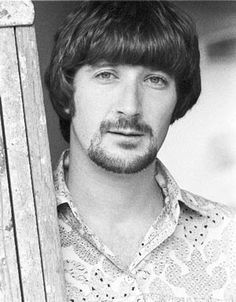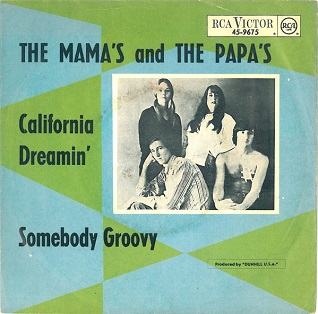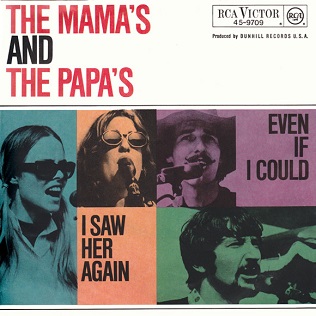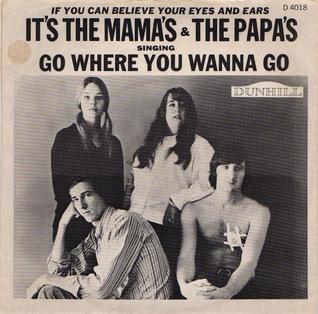
The Mamas & the Papas was a folk-rock vocal-group which recorded and performed from 1965 to 1968. The group was a defining force in the music scene of the counterculture of the 1960s. Formed in New York City, the group consisted of Americans John Phillips, Cass Elliot, and Michelle Phillips, and Canadian Denny Doherty. Their sound was based on vocal harmonies arranged by John Phillips, the songwriter, musician, and leader of the group, who adapted folk to the new beat style of the early 1960s.

Ellen Naomi Cohen, known professionally as Cass Elliot, was an American singer. She was also known as "Mama Cass", a name she reportedly disliked. Elliot was a member of the singing group the Mamas & the Papas. After the group broke up, she released five solo albums. Elliot received the Grammy Award for Best Contemporary (R&R) Performance for "Monday, Monday" (1967). In 1998, she was posthumously inducted into the Rock and Roll Hall of Fame for her work with the Mamas & the Papas.

Michelle Gilliam Phillips is an American singer, songwriter and actress. She rose to fame as a vocalist in the musical quartet the Mamas & the Papas in the mid-1960s. Her voice was described by Time magazine as the "purest soprano in pop music". She later established a successful career as an actress in film and television beginning in the 1970s.

Dennis Gerrard Stephen Doherty was a Canadian singer and musician. A tenor, he was a founding member of the 1960s musical group the Mamas & the Papas for which he was inducted into the Rock and Roll Hall of Fame in 1998.

John Edmund Andrew Phillips was an American folk rock musician. He was the leader of the vocal group the Mamas & the Papas and remains frequently referred to as Papa John Phillips. In addition to writing the majority of the group's compositions, he also wrote "San Francisco " in 1967 for former Journeymen bandmate Scott McKenzie, as well as the oft-covered "Me and My Uncle", which was a favorite in the repertoire of the Grateful Dead. Phillips was one of the chief organizers of the 1967 Monterey Pop Festival.

"California Dreamin'" is a song written by John Phillips and Michelle Phillips in 1963 and first recorded by Barry McGuire. The best-known version is by the Mamas & the Papas, who sang backup on the original version and released it as a single in December 1965. The lyrics express the narrator's longing for the warmth of Los Angeles during a cold winter in New York City. It is recorded in the key of C-sharp minor.

If You Can Believe Your Eyes and Ears is the debut album from vocal group The Mamas and the Papas, released on February 28, 1966. The stereo mix of the album is included on All the Leaves are Brown (2001), a double CD compilation consisting of the band's first four albums and various singles, as well as on The Mamas & the Papas Complete Anthology (2004), a four-CD box set released in the UK. The mono mix of the album was remastered and reissued on vinyl by Sundazed Records in 2010, and on CD the following year. It is the band's only album to reach number one on the Billboard 200.
Jill Gibson is an American singer, songwriter, photographer, painter and sculptor. She is mostly known for her collaboration work with Jan & Dean and for having briefly been a member of the successful 1960s rock group the Mamas and the Papas. She was also one of the main photographers at the historic Monterey Pop Festival in 1967.
"Dream a Little Dream of Me" is a 1931 song with music by Fabian Andre and Wilbur Schwandt and lyrics by Gus Kahn. It was first recorded in February 1931 by Ozzie Nelson and His Orchestra, soon followed by Wayne King and His Orchestra with vocals by Ernie Birchill. A popular standard, it has seen well over 400 recorded versions.

The Mamas & the Papas is the second studio album by the Mamas and the Papas, released in September 1966. The album peaked at number 4 on the US Billboard 200 album chart and number 24 in the UK. The lead off single, "I Saw Her Again", reached number 5 on the US Billboard Hot 100 chart and number 11 in the UK Singles Chart. The song was especially unique because of its origins."Words of Love" was released as the second single in the US peaking at number 5. In the UK, it was released as a double A-side with "Dancing in the Street" and charted at number 47 in the UK.
"Dedicated To The One I Love" is a song written by Lowman Pauling and Ralph Bass that was a hit for the "5" Royales, the Shirelles, the Mamas & the Papas and Bitty McLean. Pauling was the guitarist of the "5" Royales, the group that recorded the original version of the song, produced by Bass, in 1957. Their version was re-released in 1961 and charted at number 81 on the Billboard Hot 100.

"Monday, Monday" is a 1966 song written by John Phillips and recorded by the Mamas & the Papas, using background instruments played by members of the Wrecking Crew for their 1966 album If You Can Believe Your Eyes and Ears. Denny Doherty was the lead vocalist. It was the group's only #1 hit on the U.S. Billboard Hot 100.

The Mugwumps was an America rock band formed in New York City in 1964. Signed to Warner Bros., the group released one single before disbanding in late 1964. An album by the band went unreleased until 1967, when some of its former members had become famous in the Mamas and the Papas and the Lovin' Spoonful.

"Words of Love" is a song by the Mamas & the Papas from their second studio album of the same name. The song was written by John Phillips, and featured Cass Elliot as the primary vocalist. It was released as a single in November 1966.

All the Leaves are Brown: The Golden Era Collection is a 2001 release compiling the first four albums by The Mamas & the Papas in their entirety, with some single-exclusive mono versions and one non-album track. The package includes a brief history of the group and its albums by Matthew Greenwald, author of Creeque Alley: The Oral History of The Mamas & The Papas.

"I Saw Her Again" is a pop song recorded by the U.S. vocal group the Mamas & the Papas in 1966. Co-written by band members John Phillips and Denny Doherty, it was released as a single in June 1966 and peaked at number one on the RPM Canadian Singles Chart, number 11 on the UK Singles Chart, and number five on the Billboard Hot 100 pop singles chart the week of July 30, 1966. It appeared on their eponymous second album in September 1966.

Deliver is the third studio album by the Mamas & the Papas, released in February 1967 on Dunhill Records. One song, "Creeque Alley", outlines the unique circumstances in which the band met and formed. Other songs on the album are covers of popular hits from years past.
"Safe in My Garden" is a song written by John Phillips and recorded by The Mamas and the Papas. The single was briefly in the Top 100 pop chart in the United States. AllMusic.com calls the song "One of the group's finest latter-day records."

"Go Where You Wanna Go" is a 1965 song written by John Phillips. It was originally recorded by the Mamas & the Papas on their LP If You Can Believe Your Eyes and Ears and given limited release as a single. However, the record was withdrawn, and its A-side was reassigned to "California Dreamin'". "Go Where You Wanna Go" later became a hit for the 5th Dimension.

The Mamas & the Papas were a vocal group from Los Angeles, California that was active from 1966 to 1969. Their discography consists of a total of five albums and 17 singles, six of which made the Billboard top ten, and sold close to 40 million records worldwide. "Monday, Monday" hit number one on the Billboard Hot 100 chart in March 1966 and "California Dreamin'" was the top song on the Billboard Year-End Hot 100 singles of 1966.
















